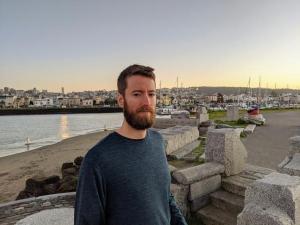Q: Tell us a little about yourself.
A: I've been through an unusual circuit to becoming a writer. I started out as an english major in college, then transferred through aerospace engineering, physics, and math as someone who was desperate to understand how things work. I went to graduate school to find out what it meant to do real physics research, but found that I often struggled with my motivation and intentionality. Maybe I had never thought through things enough; up until college, I don't think I'd spent more than 5 minutes thinking about what I wanted to do with my life. As the years went on, writing and reading kept coming up as the main things that actually motivated me to put in hard, often frustrating work on a day to day basis. That's what has brought me into the present, where I now work as a science writer.
Q: How did you get interested in science writing?
A: I had been working as a technical writer for a few years and had started to gain some professional confidence in my writing abilities. I was thinking: wow, I can actually be a professional writer, making a decent wage; that's something that was possible for me to do, something I had never considered when I was in graduate school. But I craved more creative freedom—although I worked with an amazing team of software engineers—and I started imagining what it would be like to become a science writer. That was how the professional side of my interest came about, but also there were personal signs for me all throughout my education and work experience. When I was writing my Master's thesis, I sometimes felt more fascination for explaining and interpreting a phenomenon than for understanding it. I still think about this phenomenon called local shear - geodesic curvature instability drive, a phenomenon in plasma physics. But it's not that I want to sit down and do calculations on it, it's more that I find visualizing it, describing it, and imagining it so interesting.
Q: Describe a typical day.
A: I work in the newsroom of a research and development company in Cambridge. Day to day tasks involve writing about the work that we do at the company; writing news stories, contract announcements, press releases. I try to do interviews as frequently as I can; they're the foundation of my work as a writer. I also write website copy and review scientific proposals.
Q: What's the website you visit most often for work?
A: I wouldn't be able to work without access to a good online thesaurus and dictionary. I'm still trying to find the best thesaurus, one that Cormac McCarthy could use. Let me know if you find it.
Q: If you could write about any scientific event/breakthrough/topic (past, present or future) what would it be and why?
A: I am a physicist or engineer by academic training, and I am constantly pulled to physics research, which proceeds on such a fine grained systematic level that it really becomes pretty accessible, at least for my kind of mind. That being said, there is nothing more interesting to me than the grand challenges of computing and biology, like general artificial intelligence and abiogenesis. If I can't work on them as a scientist, which for me has become pretty clear, then I might as well do the next best thing and try to write about them as a journalist.
Q: Why did you join NASW and what kinds of professional connections/opportunities are you seeking?
A: We have a local organization in Boston called New England Science Writers that has helped connect me to other writers, so joining NASW seemed natural. For me, these organizations are about connecting with other writers for professional purposes, like making contacts for pitching stories, but also meeting people with similar interests.
Follow Mordechai on Twitter @MordechaiRorvig


